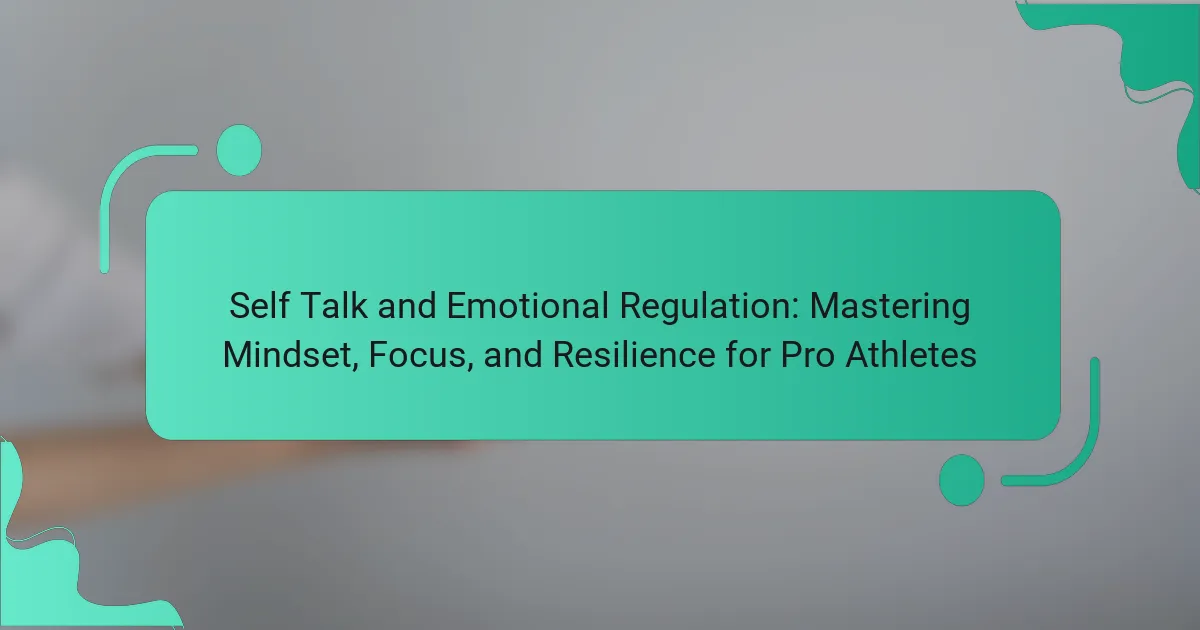Self-talk is crucial for pro athletes seeking to enhance emotional regulation and performance. This article explores how positive self-talk fosters resilience and focus, highlights effective self-talk strategies, and addresses common mistakes that hinder performance. Research shows that structured self-talk can significantly improve mental clarity and outcomes in high-pressure situations. Understanding these techniques is essential for athletes aiming to master their mindset.

How Does Self-Talk Influence Emotional Regulation in Pro Athletes?
Self-talk significantly enhances emotional regulation in pro athletes by fostering resilience and focus. Positive self-talk can mitigate stress and anxiety, enabling athletes to maintain composure during high-pressure situations. Research indicates that athletes who engage in constructive self-dialogue experience improved performance outcomes and emotional stability. This practice helps in re-framing negative thoughts, thus promoting a growth mindset essential for overcoming challenges in competitive sports.
What Are the Key Components of Effective Self-Talk?
Effective self-talk includes awareness, positivity, and focus. Awareness allows athletes to recognize negative thoughts. Positivity helps in reframing challenges as opportunities. Focus enables concentration on performance goals. These components enhance emotional regulation, crucial for resilience in sports.
How Can Positive Self-Talk Enhance Focus During Competition?
Positive self-talk can significantly enhance focus during competition by promoting a resilient mindset. It helps athletes manage anxiety and maintain concentration on performance goals. Research indicates that positive self-statements can improve overall confidence, leading to better focus and execution under pressure. Practicing affirmations before competitions can create a mental environment conducive to peak performance. This unique attribute of self-talk not only fosters emotional regulation but also reinforces a proactive approach to challenges faced in competitive settings.
What Techniques Promote Positive Self-Talk?
Positive self-talk can be promoted through techniques such as affirmation, visualization, and mindfulness. Affirmations involve repeating positive statements to reinforce self-belief. Visualization allows athletes to mentally rehearse successful performances, enhancing confidence. Mindfulness encourages present-moment awareness, reducing negative thoughts and fostering a supportive inner dialogue. These techniques collectively enhance emotional regulation, critical for pro athletes’ mindset and resilience.
What Role Does Self-Talk Play in Building Resilience?
Self-talk significantly enhances resilience by shaping athletes’ mindsets and emotional responses. Positive self-talk fosters motivation, reduces anxiety, and promotes focus, which are essential for overcoming challenges. Research indicates that athletes who engage in constructive self-talk experience improved performance under pressure. This practice cultivates a growth mindset, enabling individuals to view setbacks as opportunities for learning. Furthermore, self-talk can serve as a unique attribute in emotional regulation, allowing athletes to maintain composure and adapt strategies during competition. By mastering self-talk, pro athletes can build a resilient mindset that supports sustained success.
How Can Athletes Use Self-Talk to Overcome Adversity?
Athletes can use self-talk to overcome adversity by fostering a positive mindset. Effective self-talk enhances focus, boosts confidence, and builds resilience during challenging moments. Research indicates that athletes who engage in constructive self-talk report improved performance and emotional regulation. For instance, using affirmations can counter negative thoughts, allowing athletes to maintain composure under pressure. Additionally, visualization combined with positive self-talk can prepare athletes mentally for high-stakes situations, reinforcing their ability to navigate adversity successfully.

What Unique Strategies Can Pro Athletes Use for Self-Talk?
Pro athletes can utilize unique self-talk strategies to enhance emotional regulation and performance. Techniques such as positive affirmations, visualization, and reframing negative thoughts can significantly improve mindset and resilience.
Positive affirmations involve repeating empowering statements to build confidence. Visualization helps athletes mentally rehearse successful performances, enhancing focus and reducing anxiety. Reframing negative thoughts transforms potential setbacks into learning opportunities, fostering a growth mindset.
Research indicates that athletes who engage in structured self-talk experience better emotional regulation and improved performance metrics. These strategies not only promote mental clarity but also cultivate a resilient attitude essential for high-level competition.
How Can Visualization Techniques Enhance Self-Talk?
Visualization techniques significantly enhance self-talk by creating vivid mental images that reinforce positive narratives. These techniques help athletes focus on desired outcomes, boosting confidence and emotional regulation. For instance, mental imagery of successful performances can reduce anxiety and increase resilience. Research indicates that athletes who employ visualization alongside positive self-talk experience improved focus and performance metrics. This synergy between visualization and self-talk cultivates a powerful mindset, essential for achieving peak performance in high-pressure situations.
What Are the Benefits of Developing a Personal Mantra?
Developing a personal mantra enhances focus, boosts resilience, and improves emotional regulation for pro athletes. A personal mantra serves as a mental anchor, helping athletes maintain clarity during high-pressure situations. This practice fosters positive self-talk, which is crucial for overcoming self-doubt and enhancing performance. Studies show that consistent use of mantras can reduce anxiety levels, leading to improved athletic outcomes. As a unique attribute, personal mantras can be tailored to individual goals, making them a powerful tool for mental mastery in sports.

What Rare Attributes of Self-Talk Are Most Effective for Elite Performance?
Positive self-talk, visualization, and affirmations are rare attributes that significantly enhance elite performance. These techniques foster resilience, improve focus, and regulate emotions effectively. Positive self-talk boosts confidence, while visualization prepares athletes mentally for competition. Affirmations reinforce a growth mindset, helping athletes overcome challenges. Incorporating these attributes can lead to improved outcomes in high-pressure situations.
How Can Self-Talk Adapt to Different Competitive Environments?
Self-talk can adapt to different competitive environments by focusing on specific goals and challenges. In high-pressure situations, athletes may use motivational self-talk to enhance confidence and reduce anxiety. Conversely, in less intense environments, self-talk can emphasize strategy and skill refinement. Tailoring self-talk to the context allows for improved emotional regulation and performance. For instance, during a critical game, affirmations like “I am prepared” can boost resilience, while during practice, reminders to focus on technique can enhance skill development. This adaptability is crucial for maintaining optimal mindset and focus across varying competitive landscapes.
What Are the Psychological Impacts of Self-Talk on Performance Anxiety?
Self-talk significantly influences performance anxiety by shaping an athlete’s mindset and emotional regulation. Positive self-talk enhances focus, boosts confidence, and reduces anxiety, leading to improved performance. Studies indicate that athletes who engage in constructive self-talk experience heightened resilience and better coping strategies during high-pressure situations. This psychological tool serves as a mechanism for athletes to reframe negative thoughts, fostering a more supportive internal dialogue. Consequently, effective self-talk can transform anxiety into motivation, ultimately enhancing overall athletic performance.

What Common Mistakes Do Athletes Make with Self-Talk?
Athletes often make several common mistakes with self-talk that hinder performance. They may engage in negative self-talk, which undermines confidence and focus. Additionally, many fail to practice self-talk consistently, missing opportunities for reinforcement. Overgeneralization is another mistake, where athletes apply one setback to their entire performance. Lastly, ignoring the emotional context of self-talk can lead to misalignment between thoughts and feelings, reducing resilience.
How Can Athletes Identify Negative Self-Talk Patterns?
Athletes can identify negative self-talk patterns by recognizing specific triggers and monitoring their internal dialogue. They should keep a journal to note recurring negative thoughts and analyze situations that provoke these thoughts. Engaging in mindfulness practices can help athletes become more aware of their self-talk. Additionally, seeking feedback from coaches or teammates can provide external perspectives on their mindset.
What Best Practices Should Athletes Follow for Effective Self-Talk?
Athletes should practice positive self-talk to enhance focus, resilience, and emotional regulation. Effective strategies include using affirmations, visualizing success, and reframing negative thoughts. These practices help maintain motivation and improve performance under pressure. Regularly integrating self-talk into training routines fosters a growth mindset, enabling athletes to overcome challenges.
What Steps Can Athletes Take to Cultivate a Supportive Inner Dialogue?
Athletes can cultivate a supportive inner dialogue by practicing self-awareness, positive affirmations, visualization techniques, and mindfulness. These steps enhance emotional regulation, focus, and resilience.
1. **Practice Self-Awareness**: Regularly assess thoughts and feelings to identify negative patterns.
2. **Use Positive Affirmations**: Repeat encouraging statements to build confidence and counter self-doubt.
3. **Employ Visualization Techniques**: Imagine successful performances to reinforce a positive mindset.
4. **Engage in Mindfulness**: Focus on the present moment to reduce anxiety and improve emotional control.
How Can Coaches Support Athletes in Mastering Self-Talk?
Coaches can support athletes in mastering self-talk by providing structured guidance and tools. They can implement techniques such as positive affirmations and visualization to enhance athletes’ focus and resilience. Regular check-ins and feedback sessions can help athletes identify negative self-talk patterns, fostering emotional regulation. Additionally, coaches can create a supportive environment that encourages open dialogue about mental strategies, reinforcing a growth mindset.
